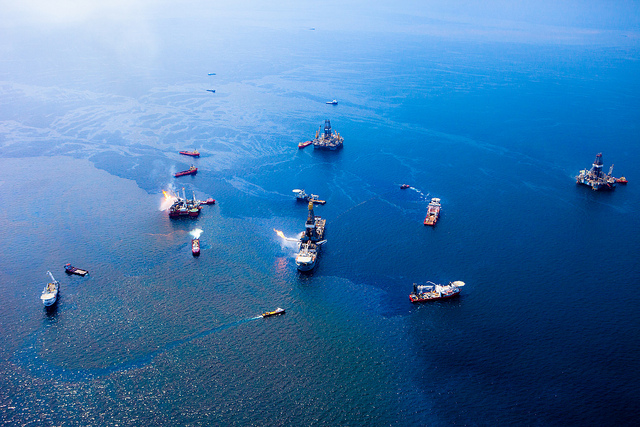
Photo Credit: Kris Krug via Compfight cc
In the wake of the Deepwater Horizon well blowout and oil spill of 2010, the Gulf Coast Ecosystem Restoration Council was established by the Resources and Ecosystem Sustainability, Tourism, Opportunities Revived Economies (RESTORE Act) to restore the Gulf Coast region’s ecosystem and economy. The Council recently released the first draft of the Initial Comprehensive Plan: Restoring the Gulf Coast’s Ecosystem and Economy and the Programmatic Environmental Assessment. The plans are listed on the Federal Register and are open for public comments until June 24, 2013.
Restoration efforts will be financed from a trust fund established by the RESTORE Act, which Congress passed in 2012. The Gulf Coast Restoration Trust Fund will be financed by civil and administrative penalties paid by responsible parties under the Clean Water Act. The total amount and timing of deposits made to the Trust Fund is unknown due to ongoing litigation, but approximately $320 million (out of $800 million) has already been deposited as a result of settlements against Transocean Deepwater Inc. and related entities.
The Council has adopted five goals to provide a framework for implementing the Initial Plan:
- Restore and conserve habitat – restore and conserve the health, diversity, and resilience of key coastal, estuarine, and marine habitats.
- Restore water quality – restore and protect water quality of the Gulf Coast region’s fresh, estuarine, and marine waters.
- Replenish and protect living coastal and marine resources – restore and protect healthy, diverse, and sustainable living coastal and marine resources.
- Enhance community resilience – build upon and sustain communities with capacity to adapt to short- and long-term changes.
- Restore and revitalize the Gulf economy – enhance the sustainability and resilience of the Gulf economy.
The RESTORE Act also designates ecosystem projects as the highest priority for the first three years. The first projects and programs selected by the Council will be designed to address ecosystem restoration. The Council will use the following criteria to select the initial restoration efforts:
- Projects that are anticipated to make the greatest contribution to restoring and protecting the natural resources, ecosystems, fisheries, marine and wildlife habitats, beaches, and coastal wetlands of the Gulf Coast region, without regard to geographic location within the Gulf Coast region.
- Large-scale projects and programs that are projected to contribute substantially to restoring and protecting the natural resources, ecosystems, fisheries, marine and wildlife habitats, beaches, and coastal wetlands of the Gulf Coast ecosystem.
- Projects contained in existing Gulf Coast state comprehensive plans for the restoration and protection of natural resources, ecosystems, fisheries, marine and wildlife habitats, beaches, and coastal wetlands of the Gulf Coast region.
- Projects that restore long-term resilience of the natural resources, ecosystems, fisheries, marine and wildlife habitats, beaches, and coastal wetlands most impacted by the Deepwater Horizon oil spill.
Stay up to date on the latest Gulf restoration information by visiting www.restorethegulf.gov.
 Carissa Ries
Carissa Ries
carissar@banksinfo.com
